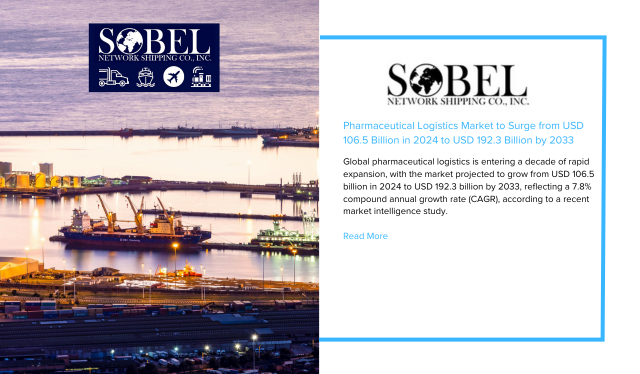Global pharmaceutical logistics is entering a decade of rapid expansion, with the market projected to grow from USD 106.5 billion in 2024 to USD 192.3 billion by 2033, reflecting a 7.8% compound annual growth rate (CAGR), according to a recent market intelligence study.
The industry’s growth is being driven by increasing demand for biologics, vaccine distribution, clinical trial shipments, and temperature-sensitive drug logistics. As supply chains globalize, logistics providers are investing heavily in technology, sustainability, and compliance to ensure patient safety and regulatory alignment.
Key Market Drivers
-
Biopharma Expansion: The global rise in biologics and personalized medicine is fueling specialized logistics services.
-
Vaccine Globalization: Continued vaccine exports and cold chain development remain key revenue streams.
-
Digitalization: IoT-enabled tracking, blockchain for traceability, and AI-driven forecasting are redefining supply chain visibility.
-
Sustainability: Eco-packaging and reduced carbon-footprint initiatives are gaining traction across logistics operations.
Market Challenges
The sector faces hurdles such as high energy and fuel costs, cold chain vulnerabilities, complex regulatory requirements, and security risks associated with high-value cargo. However, the push toward Pharma 4.0 — the digital transformation of life-science logistics — is mitigating some of these risks through predictive analytics and cloud-based control systems.
Regional Outlook
-
Dominant Market: North America
-
Fastest-Growing Region: Asia-Pacific, led by China, India, and Southeast Asia, where healthcare infrastructure and pharmaceutical exports are expanding rapidly.
Market Segmentation
By Type: Cold Chain, Non-Cold Chain, Ocean Freight, Air Freight, Last-Mile Delivery
By Application: Drug Distribution, Vaccine Transport, Clinical Trials, Hospital Supply Chain, Direct-to-Patient Delivery
Competitive Landscape
Global logistics leaders such as UPS Healthcare, FedEx, DB Schenker, CEVA Logistics, Kuehne + Nagel, and DHL are enhancing capacity and automation to capture the next wave of pharmaceutical trade. Innovation in temperature monitoring, packaging integrity, and AI-based route optimization will define competitive advantage over the next decade.
As healthcare globalization accelerates, pharmaceutical logistics will continue to evolve as a mission-critical component of global health security and trade resilience.


